Enhancing Student Success with a Top University Mentorship Platform
November 21, 2024

Mentoring is a powerful tool for student development. It bridges the gap between academic learning and professional preparation, with academic mentoring being a strategic initiative offered by universities to enhance student skills, knowledge, and confidence. Universities rely on mentoring to guide students toward success. However, managing mentoring programs manually can be a logistical nightmare. This is where mentoring software can make all the difference.
Key Takeaways
- Dynamic Matching Systems: Mentoring software simplifies mentor-mentee pairings, ensuring compatibility based on shared goals, interests, or skills.
- Streamlined Processes: Automation reduces time spent on manual tasks like scheduling, tracking progress, and collecting feedback.
- Enhanced Engagement: Built-in communication tools and reminders keep mentors and mentees connected and invested in the program.
- Actionable Insights: Analytics and progress tracking provide coordinators with data to refine mentoring programs.
- Scalable Solutions: Whether mentoring 50 or 5,000 students, mentoring software adapts to programs of all sizes.
- Support for Diverse Formats: Mentoring platforms accommodate various approaches, from traditional one-on-one mentoring to speed mentoring and group mentoring.
Why Universities Need Mentoring Software for University Mentoring Programs

Running a mentoring program involves many moving parts. Matching students with mentors, scheduling meetings, tracking progress, and collecting feedback are just a few of the tasks. When done manually, these processes are time-consuming and prone to error.
The Role of Program Coordinators in Mentoring Programs
Program coordinators play a vital role in managing mentoring programs and ensuring their success by working closely with mentees to facilitate their progress and learning. Coordinators often act as the bridge between students and mentors, ensuring that both parties are supported throughout the program. However, without the right tools, their efforts can be hindered by inefficiencies and logistical challenges.
The Importance of Creating Meaningful Matches
Universities often struggle to create meaningful matches. Without proper tools, many mentoring relationships fail to deliver value. Studies show that 82% of participants believe mentoring relationships foster meaningful connections between mentors and mentees, even across departments and organizations (Moving Ahead).
However, this outcome largely depends on pairing the right mentor with the right mentee. Poor matches can lead to disengagement and missed opportunities. Mentoring software simplifies the matching process. By automating pairings based on shared goals, interests, or skills, it lays the foundation for strong connections.
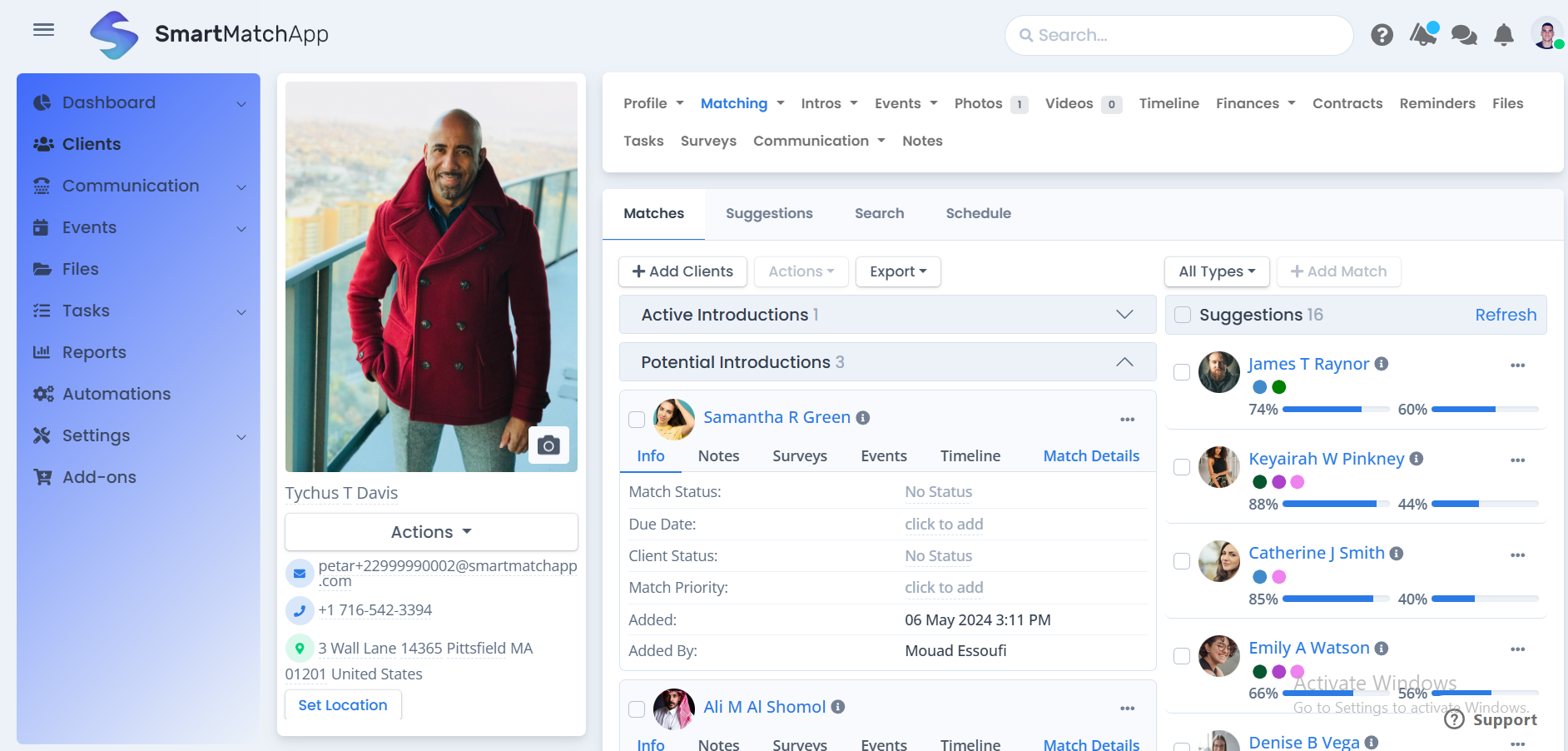
For students, this means better access to guidance and support. For mentors, it creates an organized and structured way to share their expertise. And for administrators, it saves time and improves results.
Key Features to Look for in a University Mentoring CRM
- Flexible Matching Options: The software should allow you to define how matches are made. Criteria like career goals or academic interests can lead to stronger, more productive pairings.
- Integrated Communication Tools: Built-in messaging and scheduling help mentors and students stay connected.
- Progress Tracking: Programs thrive when you monitor outcomes and collect feedback regularly.
- User-Friendly Design: A simple interface ensures higher participation rates.
- Scalability: As your program grows, the software should grow with it.
- Support Group Mentoring: Facilitate programs involving multiple mentors and mentees with customizable matching algorithms and the ability to manage different programs simultaneously, enhancing group dynamics.
Each of these features contributes to a smooth-running mentoring program.
Choosing the Right Software for Your Mentoring Program
Selecting the right software for your university mentoring program is crucial to its success. When evaluating potential platforms, consider the following factors:
- Ease of Use: The platform should be user-friendly and intuitive, ensuring that both mentors and mentees can navigate it with ease.
- Customization: Look for software that allows for customization to meet the specific needs of your program, such as tailored matching criteria and personalized communication tools.
- Scalability: Ensure the platform can accommodate a growing number of users and expand alongside your program.
- Integration: The software should integrate seamlessly with your existing university systems, such as student information systems and communication tools.
- Support: Comprehensive support, including training and technical assistance, is essential for smooth implementation and ongoing success.
By considering these factors, you can choose a mentoring platform that enhances the effectiveness and efficiency of your university mentoring program.
Why is SmartMatchApp The Best Software for Universities
SmartMatchApp offers everything a university mentoring program needs. Its core focus is simplifying and optimizing mentoring. The platform supports comprehensive mentorship programs designed to enhance engagement, retention, and talent development.
Empowering Mentor-Mentee Relationships
SmartMatchApp automates the entire mentoring process, making it quick and accurate. Its robust matching algorithm ensures mentors and students are paired based on shared goals, interests, and skills. This fosters meaningful connections and maximizes the impact of mentorship programs.
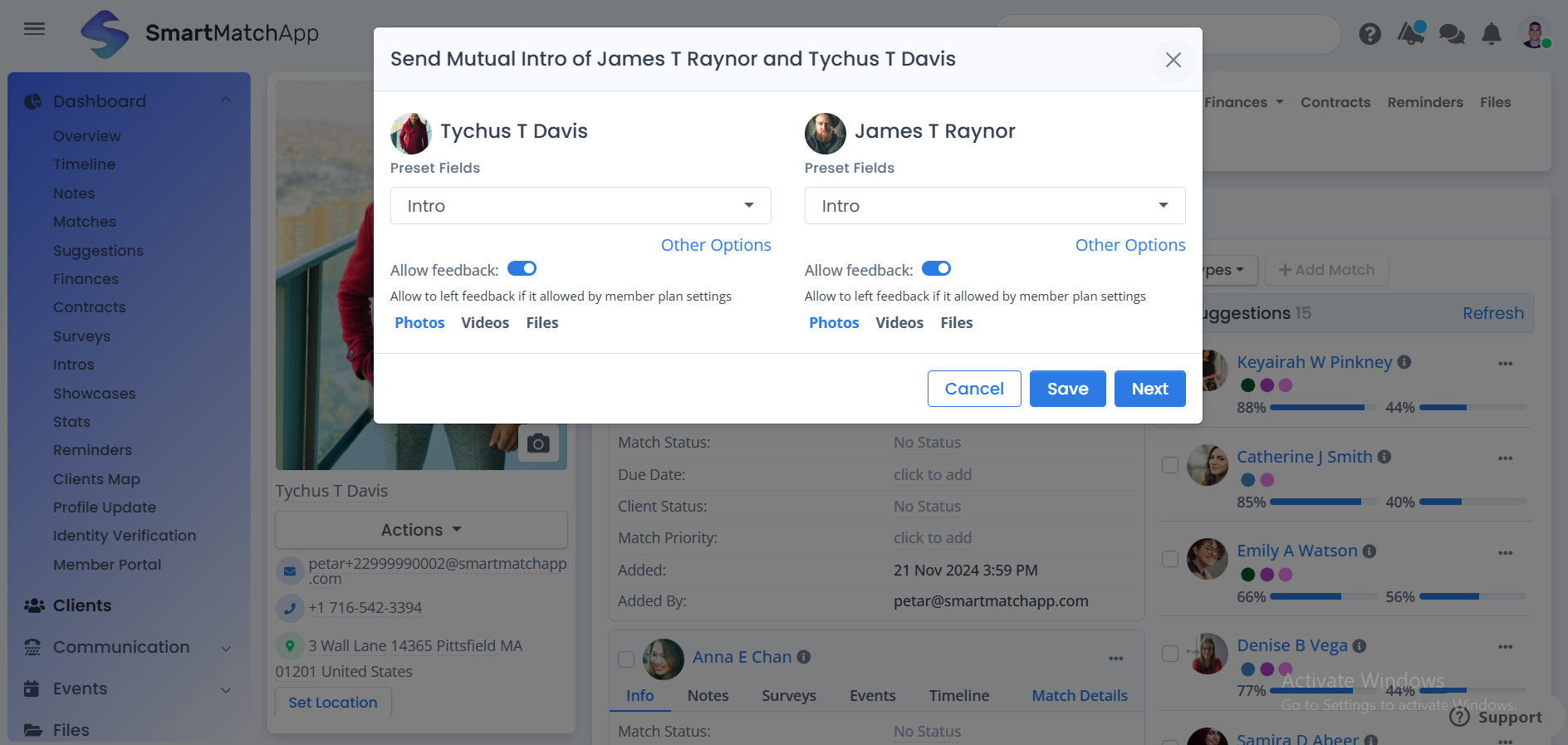
Communication tools keep mentors and mentees engaged, while progress tracking ensures accountability and provides actionable insights for improvement. By supporting effective mentoring, SmartMatchApp contributes to higher graduation rates, improved job placements, and overall student persistence.
Universities appreciate the adaptability of SmartMatchApp for mentorship programs of any size. Whether mentoring 50 students or 5,000, the platform remains efficient and easy to use, reducing barriers to engagement.
Strengthening Alumni Networks with SmartMatchApp
Beyond mentoring programs, SmartMatchApp is a powerful tool for alumni engagement. It enables universities to connect alumni with current students or fellow alumni for mentorship, networking, and collaboration opportunities.
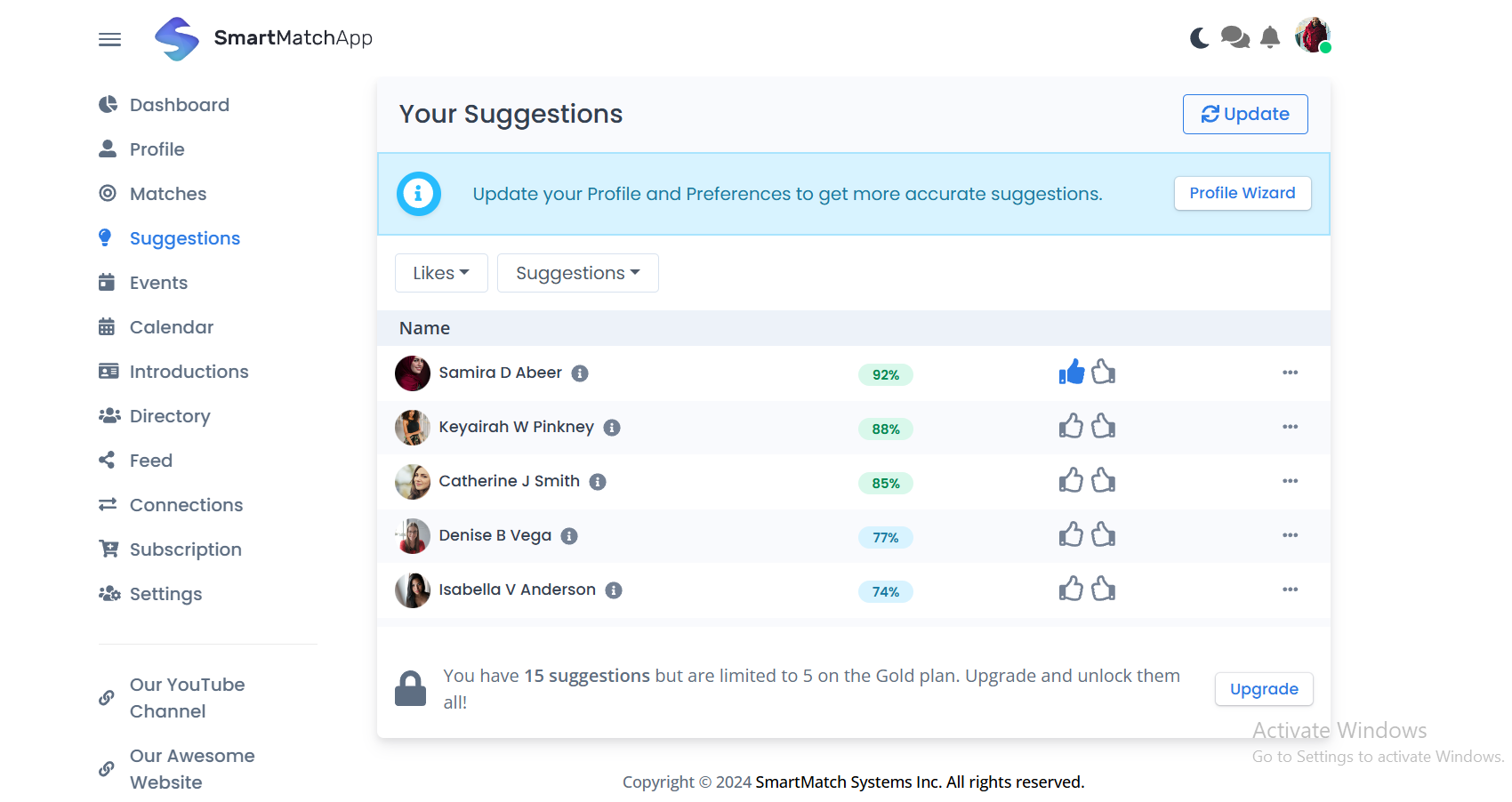
By leveraging its matchmaking technology, SmartMatchApp facilitates meaningful introductions within alumni networks. This includes pairing alumni for professional networking or creating opportunities for alumni to mentor students in their fields of expertise.
The platform also supports event organization, such as alumni reunions or networking sessions, ensuring maximum participation and value. With its adaptability and ease of use, SmartMatchApp helps universities build stronger, more connected alumni communities.
How SmartMatchApp Transformes Mentoring Programs in 2024
A mid-sized university had trouble managing its business mentoring program. Matches were inconsistent, and participation was low. Administrators spent hours manually assigning mentors and tracking progress.
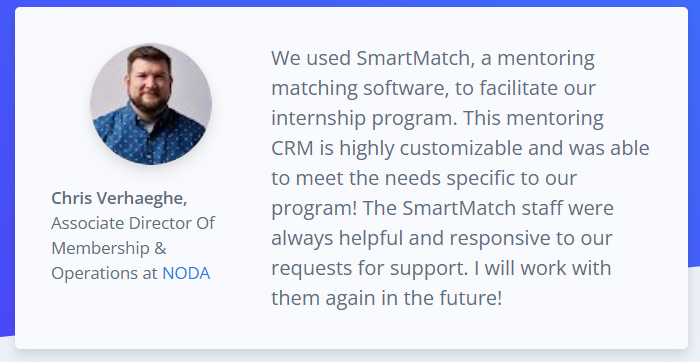
With SmartMatchApp, everything changed. Automated matching paired students with mentors based on shared interests and goals. Participation rose by 40% in the first semester. Feedback surveys showed that both mentors and students were more satisfied with the program. Non profit organizations can also use SmartMatchApp to enhance their mentoring programs, ensuring better engagement and connectivity.
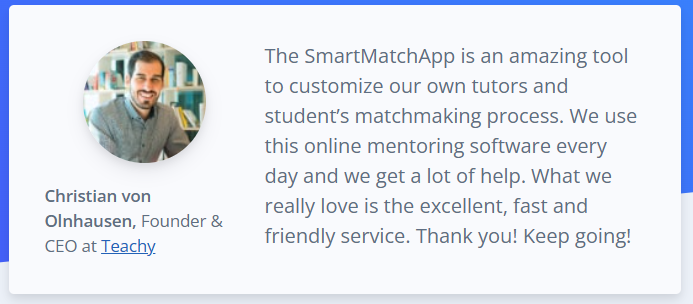
The software also saved the university time. Administrators could focus on expanding the program instead of being buried in paperwork. Want to transform your mentorship program? Click here to get in touch with us.
Other Mentoring Software Options
There are several top university mentoring software options available, each offering unique features and benefits:
- MentorCloud: A comprehensive mentoring platform that provides seamless integration with existing university systems. It offers robust matching algorithms and a user-friendly interface.
- Chronus: Known for its flexibility, Chronus allows for extensive customization and data-driven decision-making. It supports various mentoring formats, including one-on-one and group mentoring.
- PeopleGrove: This student success platform offers a range of tools and resources to support student retention and persistence. It includes features like mentor-mentee matching, communication tools, and progress tracking.
- Qooper: A versatile mentoring platform that includes mentor-mentee matching, integrated communication tools, and program evaluation features. It is designed to support diverse mentoring activities and program success.
Each of these platforms provides a comprehensive solution to enhance your university mentoring program, ensuring better student engagement and outcomes.
Benefits of Using Mentoring Software
The advantages of using mentoring software are clear.
- Time Savings: Automation reduces administrative tasks. Staff can focus on growing the program.
- Improved Matching: Data-driven algorithms lead to mentor-mentee relationships that are meaningful and impactful.
- Better Engagement: Built-in reminders and goal-setting tools keep participants involved.
- Actionable Data: Analytics help you refine and improve your program over time.
- Alumni Engagement: Leveraging alumni networks fosters greater interaction and collaboration, enriching the overall educational experience and community building within universities.
Universities that use mentoring software create better experiences for students and mentors alike.
Implementing a Successful University Mentoring Program
Implementing a successful university mentoring program requires careful planning, execution, and evaluation. Here are some key steps to consider:
- Define Program Goals and Objectives: Clearly outline the goals and objectives of your mentoring program, including the target population, program structure, and expected outcomes.
- Recruit Mentors and Mentees: Attract a diverse pool of mentors and mentees, ensuring they are well-matched and committed to the program. Effective recruitment strategies can include outreach to alumni, faculty, and industry professionals.
- Provide Training and Support: Offer comprehensive training and support for both mentors and mentees. This can include orientation sessions, mentor training workshops, and ongoing support through regular check-ins and resources.
- Monitor and Evaluate: Regularly monitor and evaluate the program using data and feedback from participants. This will help you identify areas for improvement and ensure the program continues to meet its goals.
By following these steps, you can create a mentoring program that fosters meaningful relationships and supports student success.
Introducing the Concept of Speed Mentoring and Peer to Peer Mentoring
In addition to traditional mentoring, many universities are exploring speed mentoring as a way to connect students with multiple mentors in a short amount of time. Speed mentoring sessions are structured like speed dating events, where mentees rotate through brief, focused conversations with different mentors.

This format allows students to gain diverse insights, network with a variety of professionals, and identify potential long-term mentors. It’s particularly useful for career fairs, alumni events, or targeted programs where exposure to a range of expertise is beneficial.
To make speed mentoring successful, having the right technology is critical. SpeedMatchApp simplifies session management, scheduling, and post-event follow-ups. Learn more about how speed mentoring works and its benefits in this detailed article: What Is Speed Mentoring?.
The Future of University Mentoring Programs
The future of university mentoring is exciting and rapidly evolving. Emerging trends and technologies, such as artificial intelligence and virtual reality, are transforming the way we approach mentoring and student support. AI-driven matching algorithms can create more precise mentor-mentee pairings, while virtual reality can facilitate immersive mentoring experiences, even for remote participants.
As universities continue to prioritize student success and retention, mentoring programs will play an increasingly important role in supporting student growth and development. By leveraging technology and innovation, universities can create more effective, efficient, and scalable mentoring programs that meet the diverse needs of their students. The future of university mentoring promises to be dynamic, with new opportunities for enhancing student engagement and program success.
Final Thoughts
Mentoring software is an essential tool for universities. It simplifies processes, saves time, and delivers better results. Platforms like SmartMatchApp take the guesswork out of mentoring.
If you want your mentoring program to succeed, investing in the right software is key. It makes mentoring more accessible, organized, and impactful. Start building stronger mentor-mentee relationships today.
Smart Match App is an award-winning matchmaking and membership management software CRM servicing more than 100,000 users worldwide
RESOURCES
2026 © SmartMatch Systems Inc.









 English
English
 Deutsch
Deutsch
 Nederlands
Nederlands
 Français
Français
 Español
Español
 Italiano
Italiano
 Українська
Українська
 Português
Português
 Polski
Polski
 日本語
日本語
